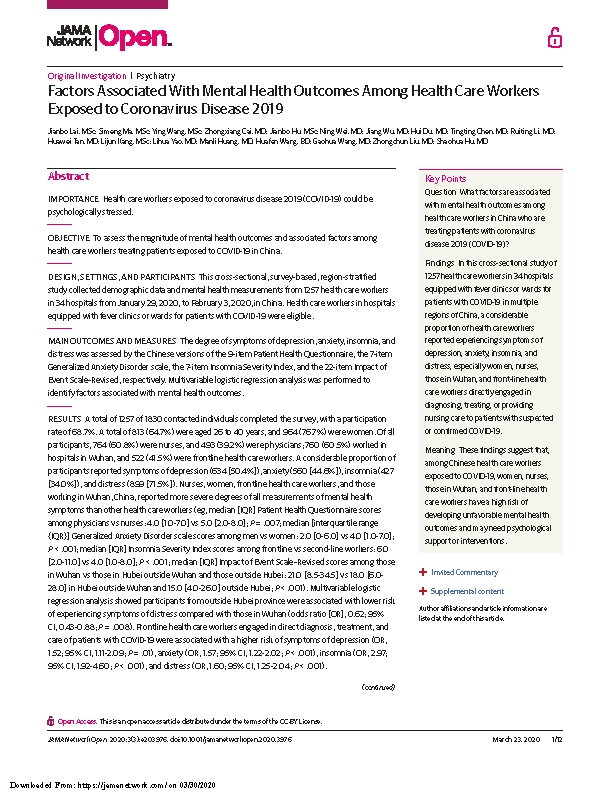31 Mar Factors Associated With Mental Health Outcomes Among Health Care Workers Exposed to Coronavirus Disease 2019
Jianbo Lai, MSc; Simeng Ma, MSc; YingWang, MSc; Zhongxiang Cai, MD; Jianbo Hu, MSc; NingWei, MD; JiangWu, MD; Hui Du, M.D.; Tingting Chen, MD; Ruiting Li, MD; Huawei Tan, MD; Lijun Kang, MSc; Lihua Yao, MD; Manli Huang, MD; Huafen Wang, BD; Gaohua Wang, MD; Zhongchun Liu, MD; Shaohua Hu, M.D.
ABSTRACT
Importance: Healthcare professionals exposed to coronavirus disease 2019 (COVID-19) may be psychologically stressed.
Objective: To assess the magnitude of mental health outcomes and associated factors among healthcare professionals exposed to COVID-19 treating patients in China.
Design, settings and participants: This survey-based study, stratified by region, collects demographic data and mental health measurements from 1.257 healthcare professionals in 34 hospitals from January 29, 2020 to February 3, 2020, in China. Health professionals from hospitals equipped with rooms for patients with COVID-19 were chosen.
Main results and measures: The degree of symptoms of depression, anxiety, and insomnia was assessed using the Chinese versions of the Patient Health Questionnaire, the Generalized Anxiety Disorder Scale Questionnaire, the Insomnia Severity Index, and the Revised Impact of Events Scale. Multivariable logistic regression analysis was performed to identify factors associated with mental health outcomes.
Results: A total of 1.257 of 1.830 people contacted completed the survey, with a participation rate of 68,7%.
- A total of 813 professionals (64,7%) were between the ages of 26 and 40, and 964 (76,7%) were women.
- Of all the participants, 764 (60,8%) were nurses, and 493 (39,2%) were physicians.
- 760 professionals (60.5%) worked in Wuhan hospitals, and 522 (41,5%) worked in frontline healthcare.
- A considerable proportion of participants reported symptoms of depression (634 [50.4%]), anxiety (560 [44.6%]), insomnia (427 [34,0%]), and stress (899 [71,5%]).
- Nurse practitioner, women and frontline health care workers, and those working in Wuhan, China, reported more severe grades on all measures of mental health symptoms than other health professionals. For example:
- median [IQR] of Patient Health Questionnaire scores for physicians vs. nurses was 4.0 [1.0-7.0] vs. 5.0 [2.0-8.0]; P–.007; median [interquartile range IQR]
- The Generalized Anxiety Disorder scale scores between men vs women were 2.0 [0-6.0] vs 4.0 [1.0-7.0]; P<001;
- The median [IQR] of the Insomnia Severity Index scores among frontline professionals vs secondline workers was 6.0 [2.0-11.0] vs 4.0 [1.0-8.0]; P<001;
- Median [IQR] Impact of event scale between Wuhan vs Hubei, outside Wuhan and non-Hubei was: 21.0 [8.5-34.5] vs 18.0 [6.0-28.0] in Hubei, outside from Wuhan, and 15.0 [4.0-26.0] outside of Hubei; P<001).
- Multivariable logistic regression analyzes showed that participants from outside of Hubei province were associated with a lower risk of stress symptoms compared with those from Wuhan (odds ratio [OR], 0,62; 95% CI, 0.43 -0.88, P=0,008).
- Frontline healthcare workers who were involved in the direct diagnosis and treatment of patients with COVID-19 were associated with increased risk of depressive symptoms (OR, 1.52; 95%CI, 1.11-2.09; P – . 01), anxiety (OR, 1.57; 95%CI, 1.22-2.02; P < .001), insomnia (OR, 2.97; 95%CI, 1.92-4.60; P < .001), and stress (OR, 1.60; 95% CI, 1.25-2.04; P < 001).
Conclusions and relevance: In this survey of healthcare workers at hospitals with COVID-19 wards in Wuhan and other regions of China, participants reported psychological risk, especially nurses, women, and frontline healthcare professionals directly involved in diagnosis , treatment and care of patients with COVID-19.



